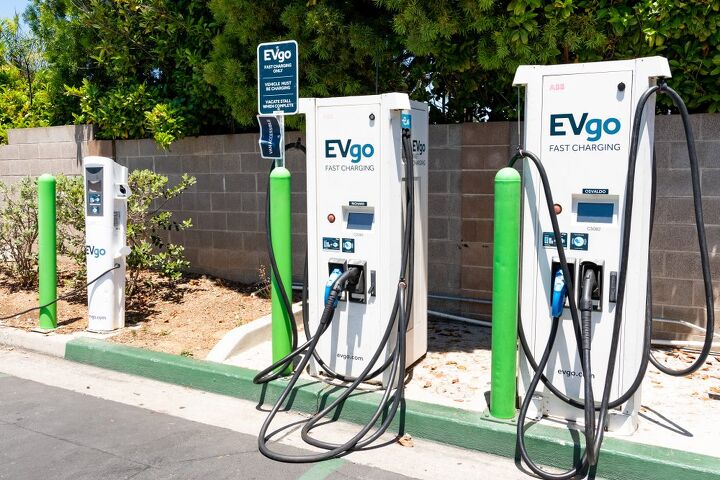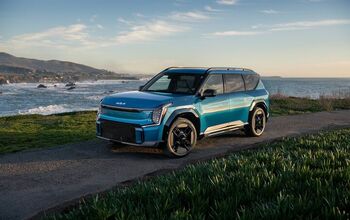EV Pricing Could Go The Way Of Gasoline Pricing. In Other News, Sky is Blue

Many so-called “analysts” in this industry more than live up to the first four letters in their name, either crying foul over something obvious or failing to recognize the trainwreck of a situation until it’s far too late. The latest? A specter of EV charging prices eventually going the way of gasoline prices, complete with dynamic pricing and unpredictable costs.
You know – things with which drivers of ICE-powered vehicles have been dealing with for decades.
There’s no doubt that pricing structure at EV fast charging stations have changed since they became a semi-regular sight in this country: per hour pricing, per kWh pricing, idle times, the lot. Proponents of per hour pricing say it’s a way to quash people parking their EVs at a charger for periods long after the thing has reached a one hundred percent charge, while the crowd championing per kWh structure argue it’s a far more balanced and fair way to mete out electrons.
Now, some groups – mainly ones who are in the game to make money – are sounding an alarm about companies which may introduce so-called surge pricing, a concept in which the cost of electricity spikes (pun intended) during periods of high demand. While the term took off in popularity thanks to companies like Uber, it’s a fact the practice has been around in fuel stations forever. Prices at the pump took off just in time for the long weekend? Gee. Tell me a new one. The amount posted per gallon fluctuates between the time you passed a station on the way to work and yer evening commute? Been going on for years.
All of which is to say: welcome to the real-world EV owners. The rest of us have been dealing with this nonsense since Christ was a cowboy. An advantage that drivers of electric cars do have is the notion that a suggested 80 percent of charging happens at home, either through the Level 1 chargers generally included with new EVs or via a Level 2 unit owners have installed in their garage. It’d be a lot more convenient for ICE gearheads, too, if we all had fuel pumps in our driveway (even if we had to pay to fill them, which is the closest allegory to having an EV charger at home, I guess; time for more coffee and to end this analogy).
Jacking prices at different times of the day will surely lead to more profitability for the companies which own these Level 3 chargers, a fine development so long as they plow a few bucks into maintaining the things and ensuring they work. Right now, there’s an excellent argument that building Level 3s is primarily a land grab for some companies; that is to say, they hoover up the prime spots, plunk their chargers in place, and forget about them until something better (or that chance to make more profits) comes along.
According to Automotive News, combined net losses for three of the biggest charging companies (ChargePoint, EVgo, and Blink) exceeded $600 million last year. Something’s gotta give – and it’s likely to be reflected in the cost of public charging.
[Images: Sundry Photography/Shutterstock; S&P Global]
Become a TTAC insider. Get the latest news, features, TTAC takes, and everything else that gets to the truth about cars first by subscribing to our newsletter.

Matthew buys, sells, fixes, & races cars. As a human index of auto & auction knowledge, he is fond of making money and offering loud opinions.
More by Matthew Guy
Latest Car Reviews
Read moreLatest Product Reviews
Read moreRecent Comments
- Peter Buying an EV from Toyota is like buying a Bible from Donald Trump. Don’t be surprised if some very important parts are left out.
- Sheila I have a 2016 Kia Sorento that just threw a rod out of the engine case. Filed a claim for new engine and was denied…..due to a loop hole that was included in the Class Action Engine Settlement so Hyundai and Kia would be able to deny a large percentage of cars with prematurely failed engines. It’s called the KSDS Improvement Campaign. Ever hear of such a thing? It’s not even a Recall, although they know these engines are very dangerous. As unknowing consumers load themselves and kids in them everyday. Are their any new Class Action Lawsuits that anyone knows of?
- Alan Well, it will take 30 years to fix Nissan up after the Renault Alliance reduced Nissan to a paltry mess.I think Nissan will eventually improve.
- Alan This will be overpriced for what it offers.I think the "Western" auto manufacturers rip off the consumer with the Thai and Chinese made vehicles.A Chinese made Model 3 in Australia is over $70k AUD(for 1995 $45k USD) which is far more expensive than a similar Chinesium EV of equal or better quality and loaded with goodies.Chinese pickups are $20k to $30k cheaper than Thai built pickups from Ford and the Japanese brands. Who's ripping who off?
- Alan Years ago Jack Baruth held a "competition" for a piece from the B&B on the oddest pickup story (or something like that). I think 5 people were awarded the prizes.I never received mine, something about being in Australia. If TTAC is global how do you offer prizes to those overseas or are we omitted on the sly from competing?In the end I lost significant respect for Baruth.


































Comments
Join the conversation
Here's a radical thought. Let's stop subsidizing things. Everything. And see what things look like after they settle down a bit. Only then can consumers make informed decisions....
BIDEN KILOWATT HOURS!